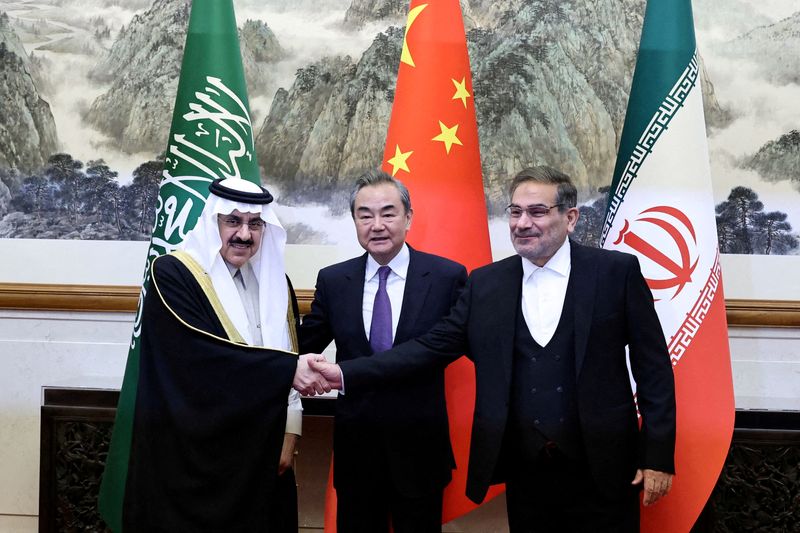(Reuters) - Adversaries across the Middle East have been taking steps to mend relations strained by years of tension and conflict, a trend most recently demonstrated in an agreement between Iran and Saudi Arabia to reestablish diplomatic ties.
The foreign ministers of Iran and Saudi Arabia met in China for the first formal meeting of their most senior diplomats in more than seven years, Saudi state-run Al Ekhbariya television said.
Here is how ententes in the region are playing out.
NEW DYNAMIC
Although Iran's nuclear programme remains a source of tension, and violence between Israelis and Palestinians has been surging, diplomacy has eased several of the region's explosive rivalries.
The shift comes amid efforts to boost economic development, and geopolitical moves as U.S. allies question Washington's long-term commitment to the region and as other powers - notably China with its growing trade ties - seek more sway.
"The Arabs, the Iranians, and the Turks are trying to create a grey area where they can all coexist, rather than a region of black and white," said Vali Nasr of the Johns Hopkins School of Advanced International Studies in Washington.
Some U.S. allies had concluded their interests are not best served by a highly polarised Middle East, he added. "There is a dynamic in the region that is pushing everyone to the middle."
SAUDI-IRAN
Saudi Arabia and Iran have agreed to reestablish relations in a deal brokered by China. The agreement between leading Sunni Arab power Saudi Arabia and the Shi'ite Islamist government in Tehran could defuse tensions and conflicts such as the Yemen war.
The deal underlines Saudi Arabia's desire for security as Crown Prince Mohammed bin Salman focuses on expanding and diversifying the economy. Saudi Arabia has turned to China at a time of strain in its historic alliance with the United States.
Iran, its economy constrained by U.S. sanctions, is meanwhile seeking to undercut Western efforts to isolate it. China is a major trading partner for both Saudi Arabia and Iran.
UAE-IRAN
The United Arab Emirates, also driven by economic interests that hinge on its reputation as a safe business haven, moved to engage with Tehran in 2019, upgrading diplomatic ties in August. Iran has appointed an ambassador to the UAE for the first time since 2016.
TURKEY-SAUDI ARABIA, EGYPT, UAE
Ties soured between Turkey and Saudi Arabia, Egypt and the United Arab Emirates after the Arab Spring uprisings of 2011, when Turkey backed Islamists who were challenging Arab autocrats for power.
Ankara's ties with Riyadh worsened in 2018 when a Saudi hit squad killed Saudi journalist Jamal Khashoggi at the kingdom's Istanbul consulate. Turkish President Tayyip Erdogan accused the "highest levels" of the Saudi government of giving the orders.
Turkey launched a charm offensive in 2021, resulting in state visits and investment deals at time of deep crisis for the Turkish economy. Saudi Arabia in March agreed to deposit $5 billion at the Turkish central bank.
Ties are also improving between Egypt and Turkey, which opposed the Egyptian army-led ouster of President Mohamed Mursi of the Muslim Brotherhood in 2013. On March 18, Turkey's foreign minister visited Cairo for the first time in a decade.
The better ties have been evident in Libya, where Turkey backs the Tripoli government while Egypt and the UAE support eastern factions. Warmer relations have made it easier for warring Libyan parties to stick with a ceasefire, diplomats say.
QATAR-UAE, EGYPT, SAUDI ARABIA
Egypt, the UAE, Bahrain and Saudi Arabia severed relations with Qatar in 2017 over accusations of Qatari support for terrorism - a broad allusion to Islamist movements, a charge Doha denied.
Saudi Arabia took the lead in rebuilding ties in 2021, declaring an end to the boycott of Qatar. Riyadh and Cairo have appointed ambassadors, while Abu Dhabi and Manama have yet to do so. All but Bahrain have restored travel and trade links.
ISRAEL-UAE, BAHRAIN, MOROCCO AND SUDAN
Israeli ties with the Arab world broadened significantly in 2020 thanks to the U.S.-brokered "Abraham Accords". The UAE and Bahrain were first to normalise ties, driven by mutual concern over Iran, followed by Morocco.
Sudan and Israel announced in February they had finalised a deal normalising ties, with the signing due to follow a transfer of power from the military to a civilian government in Khartoum.
Israel has hoped for normalisation with Saudi Arabia too.
But although Riyadh has signalled tacit support for the Abraham Accords, allowing Israeli national carriers to fly in its airspace, it says any normalisation would require progress in the Palestinians' long-stalled quest for statehood.
Separately, Turkey and Israel also last year restored ties that had been strained for more than a decade.
SYRIAN GOVERNMENT-ARAB STATES, TURKEY
Several Arab states that once backed rebels fighting President Bashar al-Assad have restored ties with Damascus.
The UAE has taken the lead, partly to counter the influence of Iran, which helped Assad regain most of Syria.
The trend has accelerated since the Feb. 6 earthquake, which prompted an outpouring of Arab support for Syria.
Sources say Syria and Saudi Arabia have agreed to reopen embassies. Sources have also said Riyadh plans to invite Assad to an Arab summit in May.
Turkey, which long supported Syria's rebels, has also reopened contacts with Assad, encouraged by Russia. Assad has rejected any meeting with Erdogan unless the Turkish military withdraws from northern Syria.
